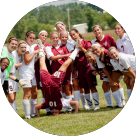Recently Visited Pages
Take advantage of this at-a-glance look at the pages on the SCC website you most often visit. Use this as a tool to navigate quickly to info you need the most. Take it one step further and click the star in the top right corner to ensure your favorite pages remain on your list of Visited Pages.
405.3 Prevention and Control of Traumatic Brain Injury (TBI) and Concussion in Sports
405.3 Prevention and Control of Traumatic Brain Injury (TBI) and Concussion in Sports
| P-405.3 | St. Charles Community College is committed to education and prevention of Traumatic Brain Injury (TBI) and concussion in sports. As a result, SCC uses a four-tier approach for all student-athletes and coaches participating in NJCCA athletics.
|
| Pr-405.3.1 | Education of Student-Athletes and Coaches All coaches and student-athletes are required to participate in yearly concussion education. The Director of Athletics gives all student-athletes concussion education materials published by the Centers for Disease Control (CDC) including a list of online resources. Student-athletes are required to verify by signature that they have received and read the concussion fact sheet prior to each season. |
| S-405.3.1.1 | Online Resources Concussion and Mild TBI – What Is a Concussion: ttp://www.cdc.gov/concussion/ Facts About Concussion and Brain Injury: http://www.cdc.gov/concussion/pdf/Fact_Sheet_ConcussTBI-a.pdf Injury Prevention and Control – Traumatic Brain Injury: http://www.cdc.gov/concussion/sports/index.html Concussion in Sports and Play – Get the Facts: http://www.cdc.gov/concussion/sports/facts.html Heads Up: Concussion in High School Sports (a guide for athletes) http://www.cdc.gov/concussion/pdf/Athletes_Fact_Sheet-a.pdf Heads Up: Concussion in High School Sports (a guide for coaches) http://www.cdc.gov/concussion/pdf/Coach_Guide-a.pdf Other Resources – Videos, Podcasts and Other Media: http://www.cdc.gov/concussion/sports/resources.html#2 The ImPACT Test: http://brainsafety.com/the-impact-test.html |
| Pr-405.3.2 | Baseline Screening Students who participate in NJCCA athletics at SCC are required to undergo neurocognitive screening before being allowed to participate in practice or as part of their SCC team. The neurocognitive screening will establish a baseline value for the student-athlete before any potential concussive event has occurred. |
| Pr-405.3.3 | Removal From Participation Upon Suspected Injury If at any time a student-athlete exhibits or states that he or she is experiencing any signs or symptoms of a head injury/concussion, the student-athlete will be removed from sports play. Signs and symptoms may include:• Headache or pressure in the head• Nausea or vomiting• Problems with balance or dizziness• Blurry vision• Sensitivity to light• Confusion, concentration or memory problems• Feeling sluggish or groggy• Loss of consciousness The student-athlete will be immediately removed from practice or competition. The student-athlete will not be allowed to return to the practice or competition for at least 24 hours and until he or she is evaluated by a physician. If there is a loss of consciousness, regardless of how brief, 911 should be called immediately. |
| Pr-405.3.4 | Repeat screening and evaluation by licensed health care professional post-suspected injury If the student-athlete has or is suspected of having a brain injury/concussion, he or she must complete a reassessment of the neurocognitive screening and obtain a physician’s release as a condition of returning to the field of play. The results of this test must be shared by the student-athlete with the athlete’s physician to aid in a determination of the student-athlete’s fitness to participate in their sport. The screenings will be administered by the Athletics Department at no cost to the student-athlete; the student-athlete is responsible for physician and medical care costs. Questions or concerns regarding this topic may be directed to the Director of Athletics at 636-922-8211 or to the Vice President for Marketing and Student Life at 636-922-8277. |
Content Owner: Human Resources
Issued: 02/2014









